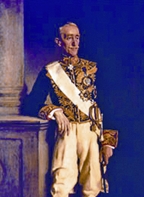Willingdon, Lord: Difference between revisions
(Content Updated.) |
No edit summary |
||
| (One intermediate revision by the same user not shown) | |||
| Line 1: | Line 1: | ||
'''Willingdon, Lord''' (1866-1941) the Governor General and Viceroy of India from 1931 to 1936. Educated at Eton and Cambridge, Marquis Freeman Thomas Willingdon had served earlier as governor of Bombay (1913-1919) and Madras (1919-24). | [[Image:Lord,Willingdon.jpg|thumb|400px|right|Lord Willingdon]] | ||
'''Willingdon, Lord''' (1866-1941) the Governor General and Viceroy of India from 1931 to 1936. Educated at Eton and Cambridge, Marquis Freeman Thomas Willingdon had served earlier as governor of Bombay (1913-1919) and Madras (1919-24). | |||
The greatest contributions of Lord Willingdon to the ''Raj'' was to persuade the Congress to join the second Round Table Conference, contain the second [[Civil Disobedience Movement|civil disobedience movement]] and help to shape the Government of India Bill, 1935. He implemented smoothly the India Act of 1935. | |||
But a little before the elections were held under the India Act of 1935 his term of viceroyalty was over and Lord [[Linlithgow, Marquis|linlithgow]] replaced him to inaugurate the elective system that he built so strenuously. [Sirajul Islam] | |||
But a little before the elections were held under the India Act of 1935 his term of viceroyalty was over and Lord [[linlithgow]] replaced him to inaugurate the elective system that he built so strenuously. [Sirajul Islam | |||
[[Category:Biography]] | [[Category:Biography]] | ||
[[bn:উইলিংডন, লর্ড]] | [[bn:উইলিংডন, লর্ড]] | ||
Latest revision as of 13:28, 2 July 2021

Willingdon, Lord (1866-1941) the Governor General and Viceroy of India from 1931 to 1936. Educated at Eton and Cambridge, Marquis Freeman Thomas Willingdon had served earlier as governor of Bombay (1913-1919) and Madras (1919-24).
The greatest contributions of Lord Willingdon to the Raj was to persuade the Congress to join the second Round Table Conference, contain the second civil disobedience movement and help to shape the Government of India Bill, 1935. He implemented smoothly the India Act of 1935.
But a little before the elections were held under the India Act of 1935 his term of viceroyalty was over and Lord linlithgow replaced him to inaugurate the elective system that he built so strenuously. [Sirajul Islam]
